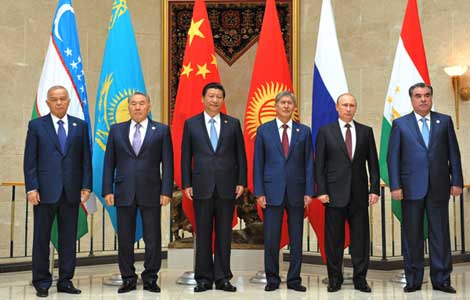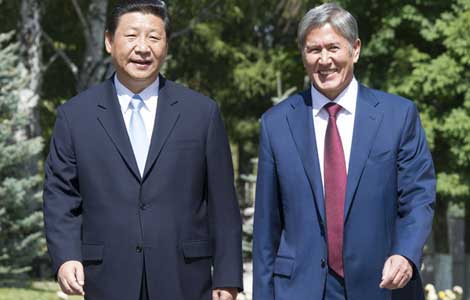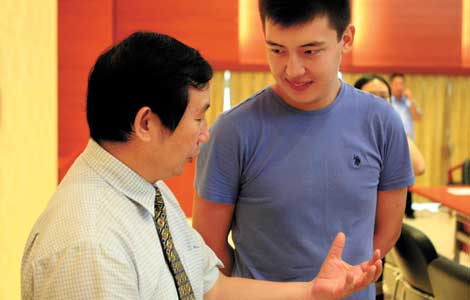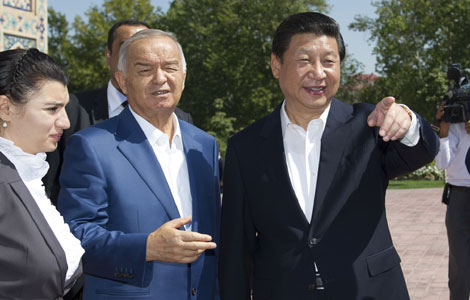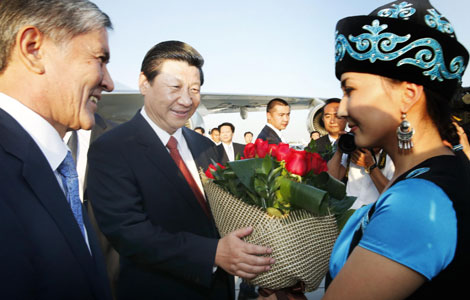Beijing, Moscow hail military ties
Updated: 2013-08-16 01:30
By ZHAO SHENGNAN (China Daily)
|
|||||||||
China and Russia hailed their high-level military collaboration and said they are planning more such exercises over the next few years, as they wrapped up their joint counterterrorism drill, Peace Mission 2013, on Thursday.
Lieutenant General Wang Guanzhong, deputy chief of the general staff of the People's Liberation Army, said after simulated combat in the drill that both sides have made military exercises, bilateral and multilateral, regular events.
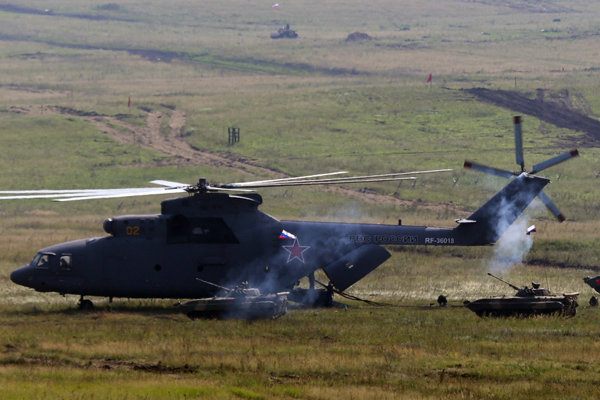 |
|
Chinese helicopters and Russian tanks take part in the Peace Mission 2013 joint counterterrorism drill at Chelyabinsk in Russia's Ural Mountains on Thursday.Qian Yunqiang / For China Daily |
"After a decade of cooperation, I am confident that the two militaries are absolutely able to conduct joint combat under any conditions," Wang said.
The drill, which began on July 27 at Chelyabinsk in Russia's Ural Mountains, marks the ninth time the two countries have participated in a bilateral or multilateral exercises since 2003. It came less than one month after the two countries completed their largest naval drill, Joint Sea 2013, in Russia.
"The two drills are regular ones, which do not target any third party or threaten any countries' interests," Wang said.
The drill at sea helped the two navies improve their long-range capabilities, and the counterterrorism drill has shown the two militaries' determination to tackle new regional threats, he said.
"Such drills will continue. ... Both sides have been discussing plans for joint military exercises for the next few years, especially for next year, based on the experiences gained in the past," Wang said.
Colonel General Nikolai Bordanovskiy, chief commander of Russia's Central Military District, who has participated in several drills with China, said the two sides' integrated work in battle planning and commanding has brought their collaboration to a new level.
It was the first time that forces from both sides' regional military area commands planned a joint drill together. Previous drills were led by the two countries' military headquarters.
The Shenyang military area command of the PLA and Russian Central Military District sent about 1,500 soldiers and 250 pieces of military equipment to the drill, including Chinese Mi-171 and Z-9 helicopters, and Russian Su-24MR front-line bombers and Mi-8 and Mi-24 helicopters.
During the hourlong simulated battle, mixed units from both sides' air forces, artillery divisions, armored tank forces and special forces defeated "terrorists". It is the first time that special forces from both sides have used the same aircraft during "combat".
"It was a challenge for us to carry out drills abroad for the first time, but we have overcome difficulties one by one, and we have found ways to improve combat capabilities and to better train the forces," said Major General Pan Liangshi, an army commander from the Shenyang military area command.
Although they speak different languages, the two militaries have worked out a set of rules to facilitate communication by using gestures with military signals, he said.
"We also managed to carry out troop deployment under combat scenarios for the first time to increase efficiency and improve war planning of the two forces in dealing with emergencies," he said.
It took 646 Chinese soldiers one week to complete troop deployment by air and rail.
Chinese helicopters, accompanied by Russian Mi-8 military helicopters, provided logistical support for the drill and stopped eight times before reaching the designated Chebarkul military range, Russian media said.
Li Shuyin, a researcher of Central Asian and Russian military studies at the PLA Academy of Military Sciences, said the level of joint drills between China and Russia has been quite high while they seek a breakthrough every time to match the ever-improving bilateral comprehensive strategic partnership.
Schedule





